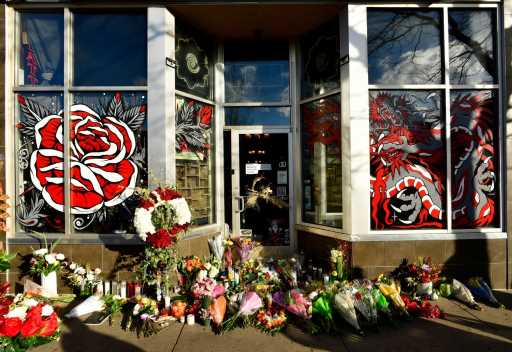The man who authorities believe killed five people in a shooting spree across the Denver metro Monday wrote about killing two of the victims in a series of novels he self-published in the four years leading up to the attacks.
Lyndon McLeod, 47, wrote about similar murders, personal grudges and a desire for revenge in the three rambling, misogynistic and racist novels, which focused on rage, violence, economic inequality.
Denver police said McLeod was under investigation in 2020 and 2021, but those investigations did not result in charges. Chief Paul Pazen on Tuesday refused to elaborate on the nature of the investigations and would not confirm McLeod’s pen name. The Denver Post confirmed the pen name through an acquaintance of McLeod’s.
In a statement Monday, McLeod’s family said they were devastated by McLeod’s actions and mourned the victims of his attack.
“Our family has been estranged for a number of years; we lost our son and brother years ago,” the statement read. “We mourn the loss of life and injuries caused by this horrendous crime. Anytime someone loses their life to gun violence it is a tragedy. The losses Monday are evidence of the deep need for a system geared toward helping mentally-ill individuals.”
Writing under the pen name Roman McClay, McLeod named both Alicia Cardenas and Michael Swinyard as murder victims in his novels. Cardenas, 44, and Swinyard, 67, were both killed in Monday’s shooting spree.
Police believe McLeod killed Swinyard inside his home at One Cheesman Place, an apartment building in the 1200 block of Williams Street. A property manager for the building told residents in an email that McLeod wore tactical gear, a police logo and a badge when he entered the building.
In McLeod’s first novel, a character named “Lyndon MacLeod” wears police gear and kills a character named “Michael Swinyard” at his apartment on Williams Street. The character in the book also kills other people in the building and robs them. The character has a list of people he wants to kill and considers some to be more important than others.
“The murders were like food in the belly, like wine at rest on the tongue,” the first book reads. “Killing people nourished the soul.”
McLeod’s second novel names Cardenas as a murder victim, and also describes an attack on a tattoo parlor in the 200 block of W. 6th Avenue.
In the novel, the character named Lyndon bursts into the tattoo shop and kills several people, including the owner of the shop. In reality, police said, McLeod went to that block on Monday, fired shots and set a van on fire, but did not kill anyone.
McLeod was never licensed as a tattoo artist or tattoo shop owner in Denver, said Eric Escudero, spokesman for Denver Excise and Licenses.
“So if he was doing any tattoo work in Denver, he was doing it illegally since he was unlicensed,” Escudero said.
McLeod’s name was included on the lease for All Heart Industry, which obtained a Denver body art establishment license in 2013, and was the registered agent for the company, Escudero said. All Heart Industry, which also used the name Flat Black Ink Corp., allowed its body art establishment license to expire in 2014.
The address for All Heart Industry — 246 6th Ave. — was taken over in 2016 by Sol Tribe Tattoo and Piercing, the shop owned by Alicia Cardenas. Sol Tribe later moved to its current address on Broadway.
The tattoo shop is also named in McLeod’s novels, and McLeod was seen near a Wells Fargo bank during Monday’s spree, police said. That bank is the target of a robbery in the novels; McLeod calls the bank the “largest corporate criminal.”
McLeod’s writings indicate he spent years thinking deeply about the crimes he went on to commit, said Max Wachtel, a forensic psychologist based in Aurora.
“What it sounds like is he had had these fantasies for a long time and was acting them out maybe through his writing,” Wachtel said. Sometimes, writing out fantasies can be an appropriate way to relieve the pressure of a fantasy without actually acting on it, he said.
“It could have been his way to get these sick fantasies out of his mind, and then he acted on them anyway, or it might have been a thinly veiled plan,” Wachtel said.
The most common motive for mass shootings is revenge, Wachtel said, and violent writings like McLeod’s should raise red flags when they name real people and places.
“In my professional experience, if one of the people who had been named in one of these books knew about it and took it to a judge as proof that this person was dangerous and needed a protective order, a judge would most likely take this seriously and issue that protection order,” he said.
It’s not clear whether those named in the books knew about the novels.
Carolyn Tyler, spokeswoman for the Denver District Attorney’s Office, said Wednesday that Denver prosecutors did not have any open investigations into McLeod. She said the office’s last contact with McLeod was about 10 years ago and that she could not discuss the nature of the contact.
Source: Read Full Article






